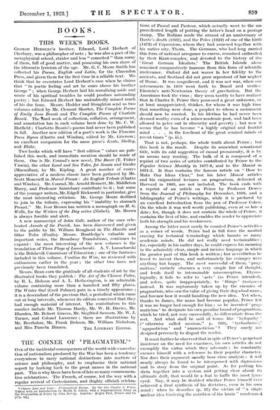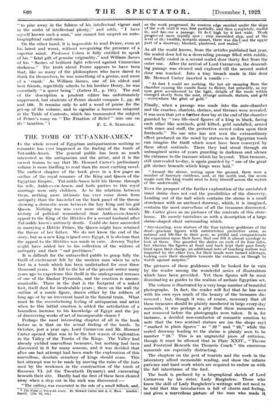THE COINER OF PRAGMATISM."
ONE of the incidental consequences of the world-wide exacerba- tion of nationalism produced by the War has been a tendency everywhere to carry national distinctions into matters of science and philosophy, and to emphasize their national aspect by harking back to the great names in the national past. This is why there have been of late so many commemora- tive celebrations. The French, of course, led the way with a regular revival of Cartesianism, and (highly official) eelebra- • Chance Loos and Logic: Philosophical Essays. By the late Charles S. Peirce. Edited with an Introduction by Morris R. Cohen, with a Supplementary Essay on the Pragmatism of Peirce by John Dewey. London : Regan Paul, Trench and Co
LIZ,. OIL) tions of Pascal and Pasteur, which actually went to the un- precedented length of putting the latter's head on a postage stamp. The Italians made the utmost of an anniversary of Dante's death (1921), and the Poles (1923) of one of the birth (1473) of Copernicus, whom they had annexed together with his native city, Thorn. The Germans, who had long carried this form of national arrogance to excess, remained enthralled by their Kant-complex; and devoted to the history of the Great German Idealists.' The British Islands alone remained comparatively immune from this form of scientific irrelevance. Oxford did not waver in her fidelity to the ancients, and Scotland did not grow repentant of her neglee1 of Hume. It was magnificent, and it was not war, when om astronomers in 1919 went forth to Brazil and verified Einstein's anti-Newtonian theory of gravitation. But the Americans took the virus ; they seem tardily to have realized that in Charles S. Peirce they possessed a great unknown, or at least unappreciated, thinker, for whom it was high time that something were done, a prophet to whom a monument should now be erected. In his lifetime he had never been deemed worthy even of a minor academic post, and had been allowed to peter out in obscurity and poverty ; but now it seems that lie has become " a highly original and fruitful mind . . . in the forefront of the great seminal minds of recent times " (p.
That is not, perhaps, the whole truth about Peirce ; but this book is the result. Despite its somewhat sensational title, with its odd suggestion of casual promiscuity, it is by no means easy reading. The bulk of it is composed of a reprint of two series of articles contributed by Peirce to the Popular Science Monthly in 1877-8, and to the Monist in 1891-3. It thus contains the famous article on " How to Make Our Ideas Clear," but his later Monist articles and his enigmatical lectures on pragmatism, delivered at Harvard in 1903, arc not included. The book ends with a reprint of an article on Peirce by Professor Dewey from the Journal of Philosophy for December, 1916, and a bibliography of Peirce's writings, while it is prefaced by an excellent Introduction from the pen of Professor Cohen. On the whole it was well worth publishing, even at so late a date ; for, though it does not contain the whole of Peirce, it contains the best of him, and enables the reader to appreciate both his strength and his weaknesses.
Among the latter must surely be counted Peirce's activities as a coiner of words. Peirce had in full force the morbid craving for technical terminology which haunts so many academic minds. He did not really need technicalities ; for, especially in his earlier days, he could express his meaning in the admirably clear, simple and incisive language in which the greater part of this book is written ; but nevertheless he loved to invent them, and unfortunately his coinages were anything but happy. The most successful of them, prag- matism,' entirely obscures a very simple line of thought, and lends itself to interminable misconception. Etymo- logically, it fails to refer to acts ' (as Peirce intended), and refers, quite inappropriately, to `things' (irpciwsara) instead. It was rapturously taken up by the enemies of pragmatism, who saw the value of giving their dog a bad name, and foresaw how it would handicap the new idea. Yet when, thanks to James, the name had become popular, Peirce felt it was no longer bad enough for him ; so lie invented prag- maticism' to designate his own peculiar brand of pragmatism, which he tried, not very successfully, to differentiate from the rest. And what shall be said of terms like hyloputhy ' (" otherwise called monism," p. 109), tychasticistu,' agapasticism ' and anancasticism ' ? They surely ale designed perversely to disgust the reader.
It must further be observed that in spite of Peirce's perpetual insistence on the need for exactness, his own articles do not exemplify the virtue which they advocate ; lie constantly excuses himself with a reference to their popular character. Nor does their argument usually bear close analysis : it will nearly always be found to be interspersed with digressions and to stray from the original point. As for putting his dicta together into a system and getting clear about its ultimate drift, that would be a feat to baffle the most lynx- eyed. Nay, it may be doubted whether Peirce himself ever achieved a final synthesis of his doctrines, even in his own mind : when lie describes (p. 37) the victim of " a single unclear idea hindering the nutrition of the brain " condemned
" to pine away in the fulness of his intellectual vigour and in the midst of intellectual plenty," and adds, " I have myself known such a man," one cannot but suspect an auto-, biographical confession.
On the other hand, it is impossible to read Peirce, even at his latest and worst, without recognizing the presence of a superior mind. Professor Cohen is fully entitled to speak of his " fatal gift of genuine originality," and William James of his " flashes of brilliant light relieved against Cimmerian darkness." The truth about Peirce appears to have been that, like so many of the philosophers who have dared to think for themselves, he was something of a genius, and more of a ' crank.' As William James, one of his oldest and best friends, regretfully admits to his brother Henry, he was essentially " a queer being " (Letters II., p. 191). The rest of the description a prudent editor has unfortunately suppressed, but students of Peirce should compare I., pp. 80 and 169. It remains only to add a word of praise for the get-up of the volume, and to signalize a humorous misprint in the Table of Contents, which has transmuted the subject of Peirce's essay on " The Fixation of Belief " into one on



























































 Previous page
Previous page